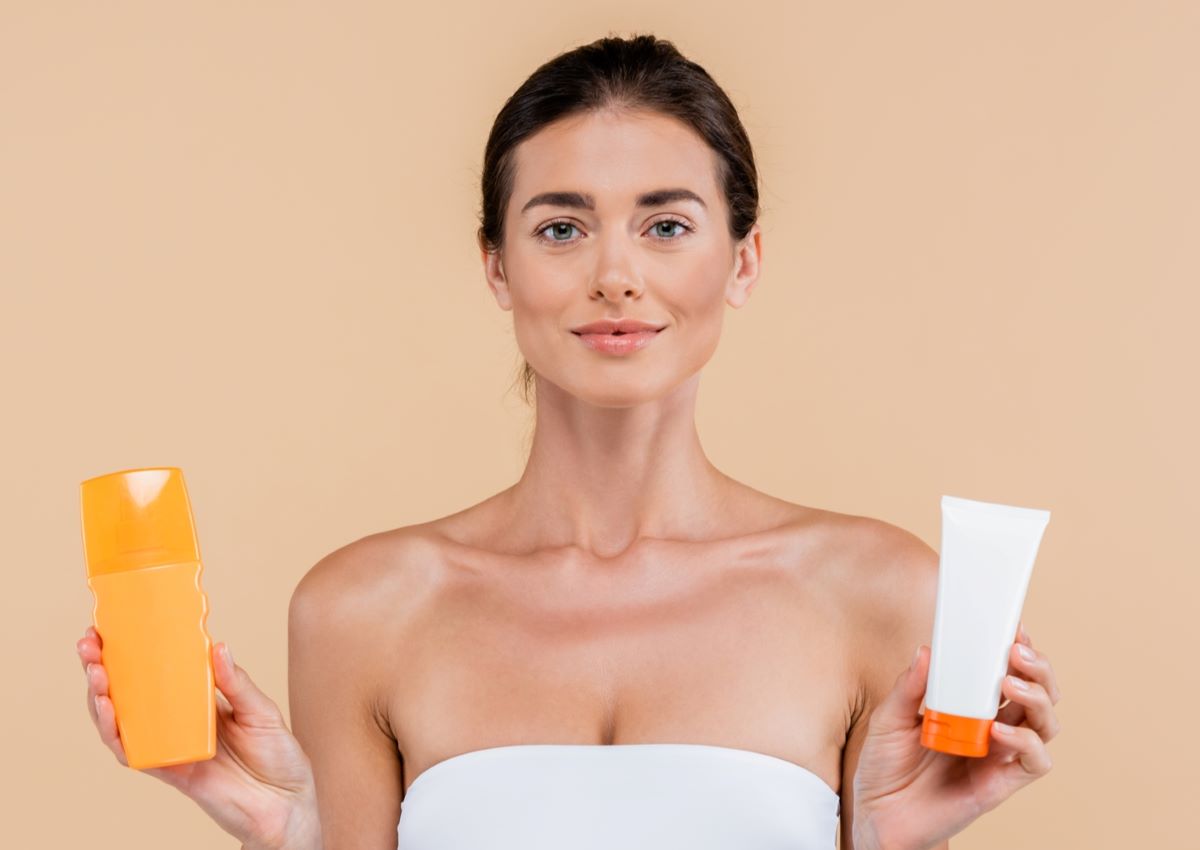Does Sunscreen Make You Fairer?
Some people claim that their skin has become fairer after wearing sunscreen often over an extended period of time.
While we all know that sunscreen can help prevent sunburn, lightening skin is not one of the effects it is commonly known for.
Does sunscreen make you fairer?
There is nothing in sunscreen that lightens or bleaches the skin. The lightening that someone might notice from wearing sunscreen often is due to the skin not tanning and losing melanin, due to the protection it has from exposure to UV rays.
Wearing sunscreen is essential to prevent premature skin aging and sunburn.
But if you are worried that it might lighten your skin or make you fairer, keep reading to find out more about whether this is true!
What Is Sunscreen?
Did you know that sunscreen and sunblock are two different things? Understanding how they work will help you know why they don’t actually lighten or bleach your skin.
Sunscreen is a topical product applied to the skin. To prevent damage from UV rays, the sunscreen absorbs them but does not physically block them.
The chemical compound turns the UV light energy into heat, which is then sent back off the skin.

Sunblock is also a topical product that reflects the sun’s UV rays off the skin and acts as a physical barrier to prevent them from penetrating the skin.
Zinc oxide or titanium dioxide is responsible for reflecting light off the skin.
As described above, both sunscreen and sunblock work to prevent UV rays from penetrating the skin, either through absorption or reflection, and they do not contain any chemicals that would cause the skin to lighten more than it is.
Does Wearing Sunscreen Lighten Your Skin Tone?
Sunscreen does not actively lighten skin tone. It deactivates UV radiation and protects the skin from damage caused by UV rays.
This also means that melanin production is reduced. Increased melanin leads to a darker skin tone, achieved through time spent under UV rays, either in the sun or on a tanning bed.
When you use sunscreen or sunblock to protect your skin from UV rays, melanin production is reduced, and your skin will not have as much melanin and, therefore, not be as dark.
As the melanin in your skin reduces, your skin tone will return to its fairer state, but it will never go any lighter than this, as no whitening or bleaching agents are involved.
While it is true that more melanin in your skin keeps it more protected from UV rays, sunscreen does a good job as well, and it means you can cut out having to spend time in the sun in the first place, building up the melanin in your skin.
How Long Does It Take?
Natural tans, no matter how dark, are never permanent. Whether you tan outdoors under the sun or in a tanning bed, your tan lasts only 7–10 days.
Your tan begins to fade as your skin naturally exfoliates, and the outer layer of skin cells that hold the tan is shed off.
Tanning on a regular basis can help maintain your color, but if you start using sunscreen or sunblock every time you are in the sun, then this tan will not develop.
It will take longer than 7 to 10 days for your skin to appear quite a bit lighter, and you will probably notice fairer skin over a few months.
This is because it will take some time for your tan to fade, for it to fade evenly, and for your base tan to disappear.
Getting your skin back to its fairest state will require you to wear sunscreen or moisturizer with SPF every day, even if you are not spending time in the sun, and use a high SPF when you do spend time in the sun so that no extra melanin is produced.
This will be a gradual change in your skin, but it will not make it any lighter than its natural tone when not exposed to UV rays.
What Effect Does Wearing Sunscreen Have On Skin?
When you start wearing sunscreen every time you go out into the sun, and when you add a moisturizer with SPF into your daily skincare routine, there will be a few things that happen to your skin.
Here are the effects that wearing sunscreen religiously will have on your skin:
Lighter Skin Tone
As we have mentioned, sunscreen and sunblock do not contain ingredients that whiten or bleach the skin.

Wearing sunscreen means that melanin will not be produced when you are exposed to UV rays, so your skin will not hold or develop a tan.
This means that with constant use of sunscreen, your skin will return to its fairest tone.
Less Hyperpigmentation
Hyperpigmentation occurs when the skin is exposed to UV rays, as it is the skin’s natural response to protecting itself from the sun. It often occurs near scars or blemishes.
Wearing sunscreen means that these areas of hyperpigmentation are lessened over time, so you will notice that freckles, blemishes, and dark spots are not as apparent, or as dark as before.
Fewer Wrinkles
Wearing sunscreen is one of the best ways to ensure that you do not develop premature wrinkles or fine lines.
Using sunscreen is a great way to reduce the appearance and development of fine lines and wrinkles.
You will protect your skin from accelerated aging, and you might even be able to reverse or lessen the appearance of wrinkles that are already developing.
This is mostly true when you wear sunscreen every time you are out in the sun.
How Do You Avoid Fair Skin When Using Sunscreen?
In an ideal world, you would want to protect your skin from damage done by the sun or UV rays in a tanning bed, but still develop a deep, bronzed tan.
Using sunscreen, especially high SPF sunscreen, when out in the sun, is the best way to protect your skin from damage.
It also means that you will not build up a tan and that your skin will return to its fair tone over continued use.
If you want to protect your skin from sun damage but still develop a beautiful tan, you could use self-tanners or apply spray tan.
This way, your skin will still have a deep tan, just without spending time in the sun.
You can still protect your skin using sunscreen over a spray tan or self-tanner. Your skin will reap all the benefits the sunscreen has to offer, but you will still get to show off a bronze tan.
Does Sunscreen Bleach Or Whiten Skin?
Sunscreen does not bleach or whiten your skin. There are no ingredients found in normal sunscreen that will cause the skin to lighten past its natural tone, so you should not expect it to happen.
Bleaching your skin can be really risky. It could lead to irritation, sensitivity, and some serious skin and health conditions.
It could also cause sensitivity to the sun. This is the opposite of why you should be using sunscreen, which makes it obvious as to why sunscreen does not contain bleaching agents.
What Does Sunscreen Bleach?
Sunscreen might not bleach your skin, but it can bleach something else. Some sunscreens contain oxybenzone, which can seep into the water and be absorbed by coral.

This chemical can disrupt coral’s growth cycle and lead to coral bleaching.
There are some great sunscreen brands out there that are reef-friendly, do not contain these harmful chemicals, and are safe to use when swimming in the ocean.
Final Thoughts
Neither sunscreen nor sunblock will make your skin fairer through the process of bleaching or whitening.
You might notice that your skin becomes lighter when wearing sunscreen religiously, but this is because it is preventing melanin production, and your skin is just returning to its natural fair tone.
Related Questions
Is sunscreen safe to use every day?
Sunscreen is safe to use every day, and it might be the safest option for your skin, especially if you spend time in the sun.
It helps prevent damage to your skin, which also prevents premature aging, hyperpigmentation, and any possible skin conditions later on.
What are the cons of sunscreen?
Sunscreen is great at protecting your skin, but there are some lesser cons. One of the main cons is that some sunscreens can clog pores and cause breakouts.
You must also find a sunscreen that does not feel oily or sticky on your skin.
Finding the right sunscreen can make these cons negligible, and the pros much more worth it.
Related Articles
Best Sunscreens For Tanning – Complete Guide







